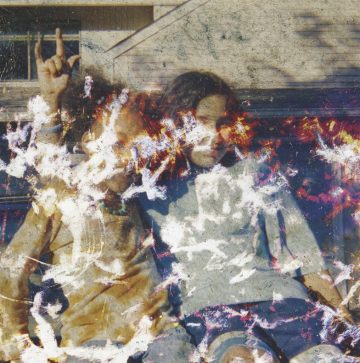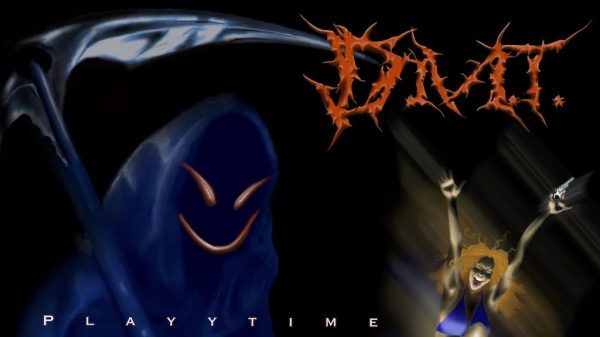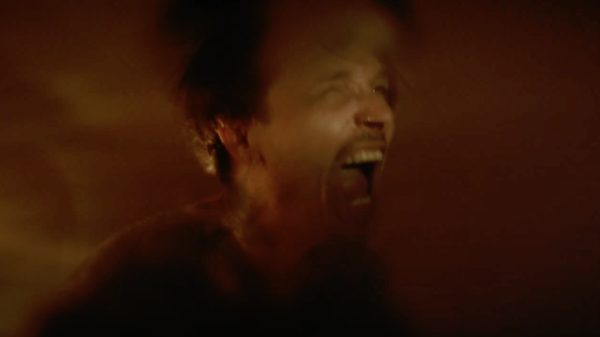As you well know, this has been the Summer of Thou. Three EPs, a full-length and a split still on the way, their already prolific catalog has expanded with, arguably, their best work to date. In lieu of a long introduction, since this interview is lengthy and was difficult to pare down, I’ll just say that I believe these records have cemented their place in music history. As an entity, the Magus era is a brilliant glimpse into the future of this already incredibly accomplished and seasoned band.

Photo by Craig Mulcahy
Starting with the artwork, the covers for the EPs and Magus are women. Is there any meaning behind that?
Bryan: I don’t know if The House Primordial is. It’s hard to tell.
Andy: They’re people of ambiguous gender.
Bryan: The Magus thing is just because the majority of Ellen Jane Rogers’ work has women as the subjects.
Andy: Yeah, she only has a couple of pictures that have men in them at all. I think that was part of the appeal of her stuff; it wasn’t a picture of some macho dude.
Bryan: To answer the question, no it wasn’t an intentional thing for us. We weren’t like, All of these records are gonna look the same and it has to be women. I think that, artistically, we tend to use those sorts of images that soften what we’re doing musically to balance things out and offer a different spin. There’s probably some subconscious thing there. When we were going back and forth about the pictures, my big thing was–a lot of her stuff has nudity–that I didn’t want any nudity. I didn’t want it to feel like we were objectifying women.
Andy: Also, we don’t want to fall into that trope either because there are so many bands that’ll have a picture or illustration of a woman where it’s just some naked devil lady and then Satan is eating her out or something. It’s kind of a shame, though, because she did have a lot of really good photos that happened to have a nipple in them that I would’ve loved to have used. But we were also limited in the pictures we could choose because some of them were already licensed out. It’s kind of coincidental because that picture of Emily (McWilliams) and her sister just happened to be a really cool looking picture.
Bryan: Yeah, the way it worked out was really organic because I’ve had this picture of Emily and her sister for years and I’ve been waiting for the right thing to use it for. It felt like it fit the acoustic record.
Andy: And she’s on the record.
Bryan: Yeah, she’s on the record. And then, of the Ellen Jane Rogers stuff we picked, we happened to pick one that had two women. That wasn’t even what I was originally seeing as the cover. Of the images we got, I had a different one in mind, but that one lent itself best to the Sacred Bones layout.
Andy: We should also note that the people in the Ellen Jane Rogers photo–and it was part of the appeal–kind of look like they could be of ambiguous gender. I don’t even know for a fact that they’re both women. It’s just a feminine look.
Each EP leading up to ‘Magus’ centers around a different genre of music, but they all represent facets of Thou’s pre-existing sound. Were they recorded individually or did you just sort existing material into the five different records?
Andy: That’s what we would normally probably do–record a whole bunch of shit and figure out where it fits. This time we actually had a plan. Well, some kind of plan. We had more of a plan this time than we normally do.
Bryan: Usually by the time we go to record, we have a pretty good sense of this is going here and this is going there.
Andy: Now we do. That’s the past 4 years I’d say. Before that, it was kind of a crapshoot. But, yeah, everything was deliberately written and recorded for these records.
Bryan: We did Rhea Sylvia probably two years ago and then we did Magus. We did Magus pretty recently, right?
Andy: Yeah, around a year ago. Maybe sooner than that. I actually can’t remember. We did the other stuff right after Mardi Gras. That was the thing where it was like, Alright. It’s time. [Laughs] And just banged it out.
Bryan: The Rhea Sylvia stuff was written before Thou got to it, essentially.
Isn’t that Matthew’s solo work?
Andy: Yeah, with the exception of one song.
Bryan: I felt like we let him take the lead.
Andy: All that really happened with that was I was like, What do you want me to play? And he was like, Just figure out whatever you want, and I threw some shit on top of every song and we did a couple of little arrangement things. Other than that, it’s exactly as he had originally recorded. Mitch hadn’t played any of those songs and he just came in and learned them on the spot. If you hear any non-complicated bass lines, that’s probably why.
You don’t seem to hide that you use direct lines from books. Who are some authors who you regularly borrow from?
Andy: “Repurpose.”
Bryan: In terms of what? I’m stealing stuff and using it in all kinds of places.
Well, for lyrics.
Bryan: For lyrics, specifically, it’s not always that I’m grabbing a line and just throwing it in there. That does happen, but nowadays it’s less out of a lack of creativity or a certain degree of laziness and more that I’m trying to call back to a certain thing. On Inconsolable, there’s a couple Jim Croce lines I steal and that was specific because I wanted it to be a call back to that song and that record and that era of his music. A lot of times, I’ll pull stuff and mangle it and reshape it so that I can re-apply it to something else. Or I’ll purposely be taking something where it was written in a certain sense and I’ll have heard something else out of it and I’ll want to get that new meaning out of it by putting it in this other framework.
Andy: Recontextualizing it.
Andy: But is there stuff from so far back that when you go and compile that stuff…Are you sourcing it? Are you putting where you found it? Do you remember where it comes from?
Bryan: I’ve started to now, but not so much so I can source the author. More so if I come to something five years down the line and I’m struck by it in a different way I can go back and see if there’s other stuff. That’s the other thing: I might see something five years ago that strikes me a certain way and if I go back to it now–and this is any kind of art–with fresh eyes, I see all kinds of other stuff that I can riff off of or pull from. It gets the creative juices flowing…Specifically on these records, though, the R. Scott Bakker stuff and Søren (Kierkegaard). Those guys for Magus. I was reading a lot of that. The Jim Croce stuff on Inconsolable. I was definitely immersed in that for months. The House Primordial was stuff I came up with, more or less. It was just easy one-liners and I wanted to have these weird, repetitive refrains. The Rhea Sylvia stuff is all Matthew except for one song.
Andy: I think it’s pretty obvious which one is not Matthew. [Laughs]
Bryan: The one I wrote was me recontextualizing some of the Matthew stuff. His stuff is pulling from all that OTO junk. I think…
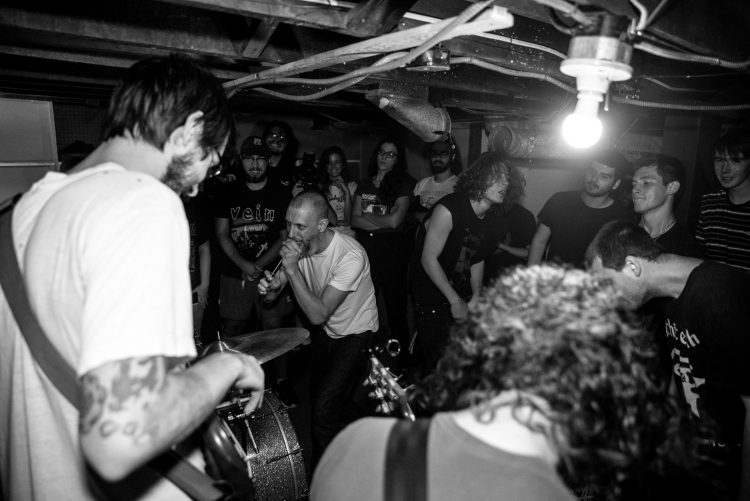
Photo by Teddie Taylor
That’s gonna be my pull quote. “The OTO is junk!” [Laughs]
Andy: [Laughs]
Bryan: You know, when we did Released From Love…, I was reading the Crowley Tao Te Ching [Liber 157]. That shit. I wasn’t writing about that stuff, necessarily, but I was pulling from that as an influence for what I wanted the feel to be. It was a good bridge between my melodramatic, self-indulgent writing and The Body’s sort of succinct, distilled…
Andy: That’s also more Matthew’s style. Simple. Little sayings.
Bryan: That’s hard for me. That’s how I tried to write Inconsolable. More accessible, easy…
Andy: I feel like it’s not as abstract. It’s more direct. It’s more so speaking to a direct experience.
Bryan: I mean, all the Thou…the bulk of the Thou material…if I write a song, I usually have a experience or some experiences in mind as, like, I have this big theme I need to talk about, but I need to write about these other things with this big theme in mind.
Andy: The same with the Rhea Sylvia stuff–the songs are meant to be more condensed. Actually, same with Magus, in a sense. It’s all supposed to be more focused. Not as much meandering or blathering on as normal.
Bryan: Yeah, blah blah blah. Big word here, big word there. [Laughs]
Andy: Heathen is the big, indulgent, lounging about record. This is supposed to be the more focused, direct hit–even if there are some long ass songs on it.
Bryan: Which is funny to me, because the Magus record is supposed to be about this introspection and process of thought. To me, immediately, I’m thinking that’s where you’re most self-indulgent. Kind of all over the place thinking about big issues.
Andy: For me it was the opposite. I feel like, even thematically, Magus is more sharpening to a point and Heathen is more stepping back and taking it all in.
Bryan: I agree. That makes more sense and is a more interesting way of approaching it. It’s just funny how we got there by intuition. It wasn’t like we sat down and thought, We need to approach it like blah blah blah. It’s just a thing that came out.
Andy: I think that’s more of a factor of us being a band for as long as we have been and not wanting to repeat ourselves. I think that’s why we ended up writing more succinct songs. Just trying to avoid what we did last time.
Andy: Is that the next question?
Yeah, that was literally the next question: especially with all of the material you’ve put out this year, how do you avoid rehashing lyrics or riffs?
Bryan: Oh, I’ll rehash lyrics. We rehash riffs too!
Andy: Hmm… Technically, yes we did. [Laughs]
But it’s not that obvious, right?
Andy: Well, to the real fans… [Laughs] But, yeah, The House Primordial has a straight-up riff from our very first demo. But most people haven’t heard that so it doesn’t really matter. To me, it doesn’t feel like it’s a big sea change or anything. Musically, riff-wise, in the big picture, it doesn’t feel like much of a sea change.
Bryan: You’re talking about Magus?
Andy: Yeah, it doesn’t feel like we’re really reinventing ourselves that much. I think it’s less about the riffs and the notes and the choices and more about the structures of the songs. That’s the thing that I feel has evolved more than anything else. Yeah, at least me, when I sat down to start writing stuff I consciously was like, I’m not going to do what I would do on Heathen. I’m not going to write this kind of riff. I’m not going to put in this section of just feedback like I would’ve before. I was trying to hammer it down a little harder than that. At least from that perspective, the trouble with that is if I avoid doing what I did on the last record and the last record was a reaction to the record before that…inevitably we are going to end up coming up with some of the same stuff. We’re going to cover some of the same ground because we’re still going to be within the genre. It’s really not until you step out of the genre boundaries that you can really push it too far.
Bryan: That was sort of the point of doing The House Primordial and Inconsolable.
Andy: Yeah, to deliberately step out of the boundary zone. Honestly, whenever I feel like I’m in danger of repeating myself, usually that’s about the time that Matthew will miraculously come through with some crazy, out-of-the-box idea. That’s usually how it goes. That’s what happened with Magus: I started writing and he was in a writer’s block period. I wrote the first couple songs or halves of songs and was like, with the single we released (“The Changeling Prince”), This is going to be the first song on the record. Got it. Me and him sat down with it and it’s good. Some months later he’s like, I have the first song, and he had this whole new concept with a whole new tuning and stuff that came to him. I’m like, Yeah, you’re right.
Bryan: And that isn’t even as far as he was talking about pushing it. I remember me and him having conversations…
Andy: He had some crazy ideas.

Photo by Teddie Taylor
Bryan: We had conversations where we were almost to the point of, Alright, all the shit we wrote with Andy, we’re gonna scrap it.
Andy: [Laughs]
Bryan: Well, we weren’t gonna scrap it–it wasn’t gonna be the record! The new half that he had written, like 3 songs, we were like, THIS is gonna be the first half and then the next half we’re gonna take it even grittier and grimmer and fuckin’ darker and just subterranean.
Andy: I think the songs, or the record, rather, ended up coming out a lot more melodic. We thought it was going to come out a lot more atonal at one point, or at least darker in some way. It ended up sounding a little more classic Thou-ish. That’s probably my fault. My style of writing is definitely more on that end of things.
Bryan: All forward movement with us is very incremental.
Andy: Very, very incremental.
Bryan: I really feel like having done the drone record and the acoustic record after Magus and then digging into some stuff that we have planned now–I think that will give us a pretty rough idea of some places we can take the next full-length and make it more interesting. Maybe it’s good that Magus isn’t quite as big a departure. The next record will probably be more of a departure.
Andy: I don’t know, that’s what we said last time. [Laughs]
Bryan: It could do in the other direction.
Andy: I was just saying this in an interview the other day. I’m really glad that even though, what, 5 or 6 years ago, we had all of these grand ideas about stepping way outside and doing some real out there ideas. I’m glad we weren’t able to fully step as far out as we wanted to because it would’ve put us in a weird place where we might have painted ourselves into a corner. I’m glad we’re doing a more incremental thing. I think that’s helped us to learn what our strengths are without potentially spending a lot of time on a record that ended up sucking. I feel like now I know what to do. Having done Inconsolable, I know now what to do next time we want to do something like that and I know where he dangers lie and where the strengths lie. It’s a lot easier now, having gone incremental.
You released your first video this year. Why now?
Andy: That is a good question. A very good question.
Bryan: I think it was kind of my push, and it wasn’t because of Sacred Bones, but I just had an idea for something that I thought would be funny to us.
Andy: Do you think that you would’ve done this 5 years ago? Like, if you had had an idea, would you have wanted to make and release a video?
Bryan: Well, I think part of it is feeling like we have the tools to do something right, which is Mitch’s expertise and having Michael Moises and Derek Zimmer and Craig Mulcahy there to lend some other insight and stuff we needed. In the past, the tools weren’t in place, the idea wasn’t really there for something we could do…
Andy: I think we would’ve had a little more reluctance to do it in the past.
Andy: That’s what I’m getting at. I feel like, as a group at least, and that’s probably aside from Mitch and, at the time, Josh, there was a general reluctance to do a video at all. I can see from your perspective you’re probably thinking, Oh, that’s because it wouldn’t be the right thing.
I sort of assumed it was like the portrait thing where you just didn’t do that.
Andy: I think if I would’ve pitched the idea for this music video to you 5 or 10 years ago you wouldn’t have wanted to do it.
Bryan: Maybe not.
Andy: I’m curious what the shift is. Are you just getting more used to compromising? Not that I think we compromised by making it since we did it exactly how we wanted…
Bryan: It’s not the compromise; I think I have more openness to looking at different things that years ago I would’ve scoffed at as being ineffectual and saying, I can subvert this thing in a certain way that makes it fit what I want. I can get out of it what I want and approach it in a way that it’s useful to me. Where I can make a point, whether that gets across or not. I think with video, specifically, there was always a reluctance because I couldn’t think of many videos that didn’t put the band on a pedestal. I’ve always worked against that with us. I’m not interested in promoting the cult of personality of the 6 or so people in Thou. I’m interested in promoting a certain aesthetic and a feel and a tone and a certain amount of subversion.
Andy: It’s funny, though, because even in subverting that, that itself is the cult of personality. I mean, I’m fine with that.
Bryan: Yeah, it’s a constant balancing act of how much of the focus is “Thou” and how much is the art.
Andy: The idea of Thou.
Bryan: Thou as a thing. From a more practical sense with all the different labels involved, there was a sense of, Maybe I can do something to feed their need for a more standard promotional-type asset, but I can do it in the way that we would do it.
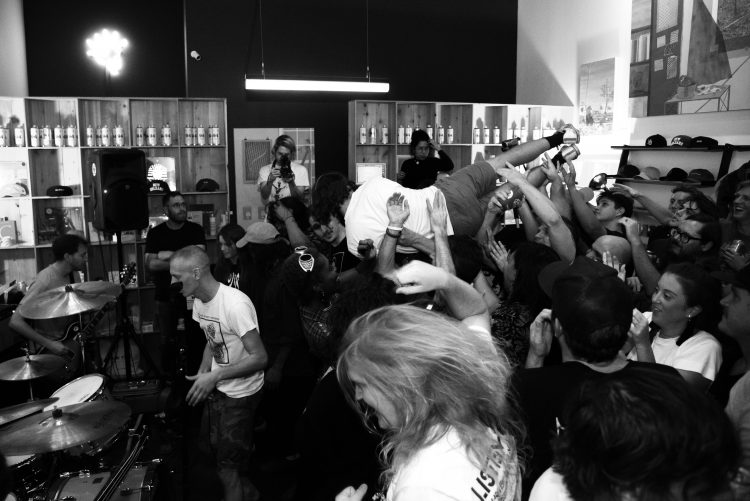
Photo by Teddie Taylor
Andy: And we didn’t even maximize the effectiveness, because we released the single before the video, so people have already heard the song. If we really wanted to go all out we could’ve done a typical promotional push or whatever.
Bryan: Juggling the labels and their different needs and their unease with signing off on a very atypical approach to releasing music. If I had been able to really talk them into it my way, we would’ve done things even more extreme than it seems. There wouldn’t have been some pronouncement of, Here’s the plan of releasing all of these records! Get ready! The records would’ve just come out without us saying anything. That’s how we did The House Primordial and I fucking loved it. I love that people were like, Oh this is the new Thou record! This is crazy. This sucks! I was feeding off of people not knowing what was up and I thought we could’ve really fueled that fire even more doing it 3 more times!
Andy: How can I manifest my alienation that I already feel? I’ll just put even more distance!
Bryan: I thought that would’ve been a fun way of doing things.
Andy: If I could go back, I would push more for releasing Inconsolable first. Just to throw even more of a curve ball at people. And also to get a little more attention put on that one.
Bryan: I would’ve liked that record to have gotten more attention because, to be honest, it’s maybe my favorite of the four.
Andy: It’s the best. Easily.
Bryan: I think the problem with that, and the reason I was pushing not to do that, is because it feeds too much into, This is what a metal band does when they get old. They release an acoustic record and soften up. Maybe this is too reactionary of me, but my mission statement, my guiding thing with Thou is that I don’t want to get softer; I want to get heavier. I want to get more vile. I don’t want to be the band that, as they age, they soften the edges. I want to be the band that, as they age, they get worse and worse in terms of accessibility.
Andy: We’re already on the path to that, really. Maybe if we do make an acoustic record, if we make another one, we have to do some really messed up concepts or jarring production value that draws people in and pushes them away at the same time.
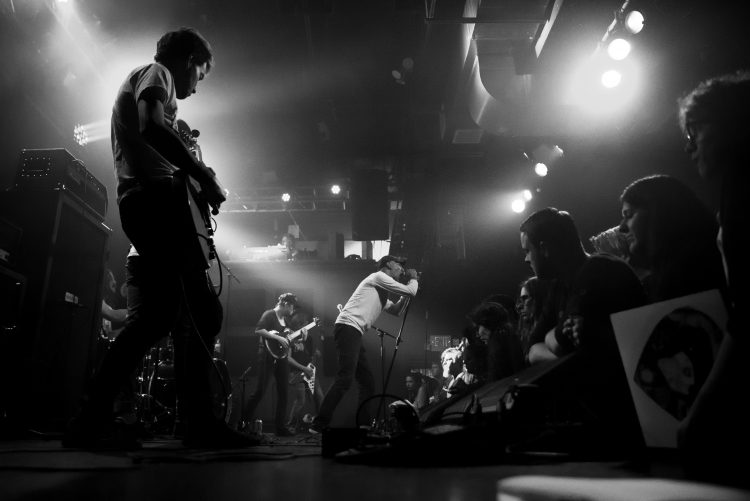
Photo by Teddie Taylor
Especially for Magus, are there any broad thoughts or ideas that you want people to take away when they listen to it?
Andy: Yeah, it’s fuckin’ heavy. [Laughs]
Bryan: It’s fuckin’ heavy, bro! [Laughs] Hey man, you listenin’ to this? Yeah, there’s thematic elements, the same as Heathen or any of our other full-lengths. I don’t know if I’m necessarily worried about people taking that stuff away from it or not.
I mean, if someone listens to it and then goes and reads the lyrics, is there something that you’d hope they went and looked up and learned more about?
Bryan: How to be a good person. How to not be a fuckin’ douchebag. How to respect women, as a first step maybe. Not being a total scumbag turd.
Andy: Yeah, that’s fair.
Bryan: I feel like those kinds of things, as far as social politics, that’s been in all our songs. That’s been in our songs since I joined and started writing for Thou. I try not to hammer people in the head too much with that stuff, especially in the last few years. I’ve tried to be less obtuse with how I’m approaching whatever point I’m trying to make and hoping people can get to that on their own. Me and Andy have talked about writing another record full of shit where it’s impossible not to get the point were trying to make. We are making a statement here and it’s not ambiguous. There’s potential for that. I don’t think I write well enough. I can’t write that kind of stuff well enough for it to be artistically interesting, I think, on a larger scale, but if we’re talking about a smaller project where I can really focus and hammer it out, I could probably get something.
Andy: I think you could do it. It might be you sitting down with someone who has a more straightforward approach. You starting out with lyrics and sitting down and paring it down and changing it up. Kind of like we did with Inconsolable.
Bryan: It’s hard for me. I tend to turn the lens on myself or us or Thou a bit more, so even if I’m trying to make a point I’m more likely to call out our own hypocrisy or inconsistencies before I point the finger at the world. I don’t know if that comes across to people when they read stuff, but as far as what I’m writing about I usually turn the critique predominantly on us and on me. If we were to do something more straightforward I wouldn’t want to dress it up at all. We have sort or hyper-feminist songs that, in the past, we’ve dressed up a bit or danced around the issue.
If you’re going to be blunt, just be blunt.
Bryan: Yeah, and for me that’s a hard thing to do without it sounding bad or uninteresting. That’s not usually my approach. The writers I like who write stuff like that, like Kathleen Hanna or Sam McPheeters or Jody Gates, their take on political and social commentary is usually witty and creative.
Andy: It doesn’t come across as overly-sincere.
Bryan: Or too hamfisted.
Andy: That’s part of what turns me off to some hardcore stuff. More the political 90s stuff, but there’s some bands that come across too hamfisted. You can be obvious about making a point and still have it work as something that you can read and it aesthetically works together and is pleasing in a way. You can still get your point across.
Andy: It’s about as blunt as you can possibly get.
Bryan: We had people who were like, But Tyrant is a Christian record. It’s like a celebration. What are you talking about?! How could I be more clear?
Andy: That’s less of a failure of your writing and more of a failure of their reading comprehension.
Bryan: Maybe so, but writing a record like that isn’t to preach to the choir like, Yeah! Don’t hate women! Don’t hate homosexuals! Don’t be racist! My impetus is the fact that I feel like there are so many people who have horrible politics and no social graces and we’re surrounded by these people and maybe they come to our shows or have some interest in our band. I want to be clear that they’re not welcome. Until you absolve yourself of all the garbage you’re carrying around and throwing out in the world, it makes me feel kind of shitty that you even listen to the records or like our band. There’s this cognitive dissonance and you can’t rectify that by being a shit bag. I don’t want that. You can listen to the records, but you have to get rid of this other crap that you’re holding onto. I don’t know how to be more clear about that.
The reason I brought that up is because when you played the anti-ICE show and promo-ed it on Instagram, someone commented and seemed shocked and confused. You commented back asking if he’d missed the point in everything Thou has ever done.
Andy: When people don’t understand they’re like, You guys are against ICE? I didn’t realize you guys were fuckin’ SJWs. Most people aren’t going to pick up on the nuances. Any time we come out and say something that’s a talking point of someone on the left, there are certain people that already have a box to put you in. You must be a liberal blah blah blah microaggression obsessed… They wouldn’t know that we are also critical of that. We’re coming from a different perspective. And also the fact that everyone in the band would probably have a different take on that and we all tow a different line politically. That’s where it can be hard.
Bryan: We can agree on certain things.
Andy: We’re all just different stripes. It’s frustrating. It’s hard to say, Yeah, this is what we’re about, without making some hamfisted song that comes across as cheesy. We’re trying to present something, and certainly on the full-lengths, that’s a more nuanced and intellectualized approach. We’re not going to release a full-length that has some dumbed down thing on it. Well, maybe next time!
Bryan: To me, the full-lengths are a broader picture and I can hone in on really specific things.
Andy: It’s more expressive.
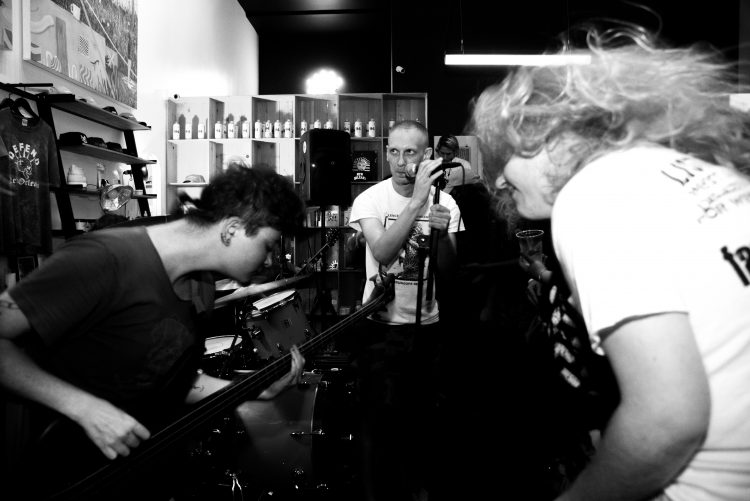
Photo by Teddie Taylor
Bryan: Dude, Magus, the larger portion of it, if not all of it, is very critical of both the sort of conservative idiot vaguely Nazi bullshit that’s coming up in America and it’s also critical of the Internet SJW callout accountability hypersensitive shit. It’s critical of both of those extremes in a very, I think, easy way to read if you’re looking at it through that lens.
Andy: People are always going to see what they want to see in the lyrics. If they see that we’re critical of anything on the left, they’re going to think that we’re on their team. They’re going to see their own ideals reflected back to them in the lyrics.
Bryan: That is the weakness of writing things in an ambiguous way.
Andy: That’s why I think that a band like, even though they weren’t successful at it because of their scale, Nirvana was good at it in their interviews and in their liner notes. Making it real explicit what they were about. Even if they’re too big and it wouldn’t matter…
Bryan: I still don’t think the point comes across. Even a band like Rage Against The Machine where it’s inextricable from the songs what they’re writing about–you still have these racist frat dudes.
Like when Paul Ryan said they were his favorite band…
Andy: That’s the thing. Art can only do so much. Art’s always going to be up for interpretation. Even if you’re being as explicitly whatever as possible.
There are always the people who say they’re just listening to the music and ignoring what the artist is talking about.
Andy: Yeah, and they don’t even care. It’s angry. I’m just going to channel that into whatever I’m feeling and not even pay attention to the lyrics. There are plenty of people like that. You can only do so much. If you really want to get the message across in the most successful way, I guess you should be an activist or a politician.
Bryan: At least we can weed out some trash. Get rid of some of the dead wood by being very clear. Maybe, maybe that won’t work.
Andy: I’m sure there are plenty of people who are like, I don’t like the politics, but their riffs sure are heavy.
Bryan: Great band to smoke weed to!
Andy: Wish they weren’t SJWs, but me and my bros will put it on.
Bryan: Don’t like the way they dress, but, whatever, I just close my eyes.
Andy: We’ll get pumped up for the Unite the Right rally by putting on The House Primordial. That probably doesn’t exist but you never know. That’s the pull clip. Take that out of context.
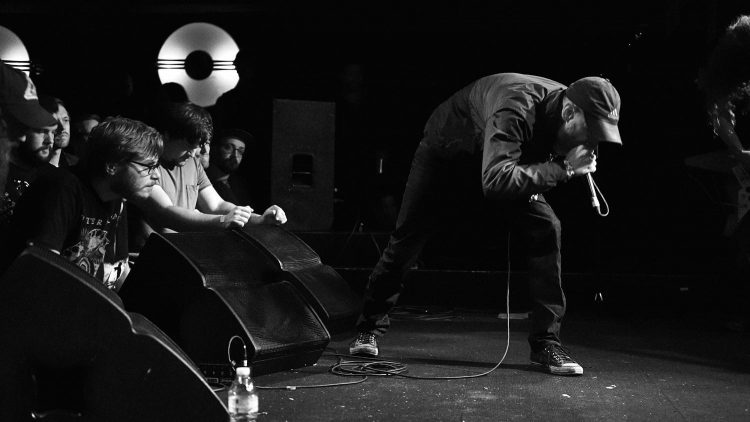
Photo by Craig Mulcahy
Okay, time to plug stuff! What else do you have going on? Any more releases? Tours?
Bryan: Oh, plugs for Thou.
Andy: Yeah, plugs for Thou. Not just plugs in general. New Moloch record!
Bryan: Yeah, we have the Ragana split coming out around the same time as Magus. That stuff on our side is pretty old.
Andy: Very old. It’s from 2015 maybe?
Bryan: Two songs we wrote right after Heathen. It’s kind of interesting. I was writing, those songs specifically, about how irritated I was getting with us as a band in our bigheaded response to the acclaim Heathen was receiving. Not that we’re turds in general, but behind closed doors there was a bit too much self-congratulation.
I need to start writing down these pull quotes. “We’re not turds!” [Laughs]
Bryan: We’re not turds (generally).
Andy: Eh, I don’t know. I’d say we’re kind of turds. I feel like anyone who has spent any time with us on tour would think we’re turds.
Bryan: We’re difficult people to swallow sometimes.
Andy: We shit talk a lot.
Bryan: Yeah, but you don’t think everybody does?
It’s one of the joys of life.
Andy: I agree. Tours–it’s not 100% yet…
Bryan: We’re gonna tour November/December on the West Coast. We’re gonna tour March/April in the Midwest and on the East Coast. We’re going to tour July/August in Europe.
Andy: All that’s stabilized but not fleshed out yet.
Bryan: Rough sketches unless something crazy pops up. We’re playing Mexico City in a couple months. Never been there. And we’re playing Little Rock next summer. Haven’t been there in a long time.
Andy: 2011. It’s been 7 years. The Black Tour was the last time we were there.
Bryan: Anyway, those are our plugs.
Magus is out NOW via Sacred Bones Records.


